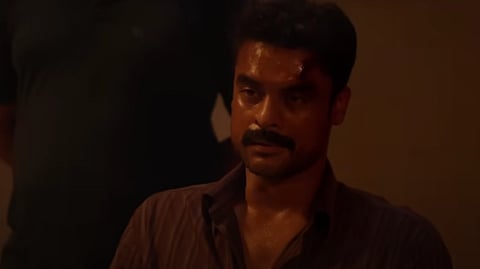

Narivetta (Malayalam)
As Narivetta opens, a quote by Milan Kundera fills the screen: “The struggle of man against power is the struggle of memory against forgetting.” This powerful line immediately gives hope for an equally powerful movie. Loosely based on the 2003 Adivasi protests for land rights in Wayanad’s Muthanga, Narivetta came with the promise of upholding ‘memory’ against the powers of the land. But what we get instead is a rather late coming-of-age story of an angry young police constable.
In the initial scenes, the film hastily shows us how Adivasi families in Wayanad were forced into poverty and hunger. We are told that the migrant population and the government’s policies played a role in displacing the Adivasis, but the context lacks nuance. Soon, the narrative travels down south to Kuttanad, where 28-year-old Varghese Peter, played by Tovino Thomas, is struggling to find a job that he likes.
Directed by Anuraj Manohar and written by Abin Joseph, Narivetta seems eager to shine light on multiple issues of social relevance– farmer suicides and unemployment– but only as background decor.
Ample time is wasted on exploring the romantic arc between Varghese and Nancy (Priyamvada Krishnan). For a while, you are left wondering when the scene will shift from the backwaters and boat rides to the hills of Wayanad. Finally, when it does, you realise the several minutes you spent trying to get to know Varghese don’t contribute much to the rest of the story.
Under pressure from Nancy and his family, Varghese soon takes up a job as a police constable. Fresh out of training, he is deployed in Muthanga, where Adivasi families have been protesting for over a month. A senior officer, Basheer (Suraj Venjaramoodu), takes Varghese under his wings.
The young cop is hot-headed and quick to thrash protesting persons over the slightest disagreements. But the scenes preceding these do not establish that Varghese has a bad temper, leaving this change in character unconvincing.
The remaining parts of the film are almost entirely located in Wayanad, where Varghese becomes privy to the internal politics of the force, in which not all is black and white. In a dramatic moment of realisation, he rebels against his superiors.
Only, Varghese’s journey from a job-seeking lover boy to the righteous cop who rebels against his bosses fails to impress or convince. Tovino’s perpetually anguished expressions don’t help much.
The remaining cast, including Arya Salim (playing CK Shaanthi, inspired by CK Jaanu) and Cheran (playing R Keshavadas IPS), perform as well as the script permits. The tribal tunes by Jakes Bejoy were a fitting addition, but the background score didn’t make an impression.
Narivetta’s script suffers from a lack of conviction, reducing a historical movement, rather unfortunately, to the heroic last act of the leading man. The camera is almost always placed outside the protesters’ fence, looking in from the point of view of the young and homesick Varghese. It is almost as if the filmmakers want us to feel for poor Varghese, who has been forced into a job he detests.
The gaze is always that of the outsider, and when it does side with the Adivasis, it is only to be saved by the anguished, rebel cop.
Final verdict: Underwhelming, lost potential.
Disclaimer: This review was not paid for or commissioned by anyone associated with the film. Neither TNM nor any of its reviewers have any sort of business relationship with the film’s producers or any other members of its cast and crew.